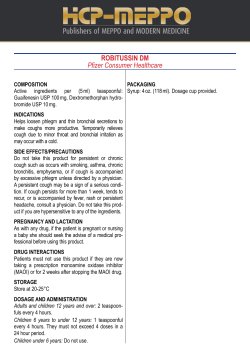
Document 56637
Recognising worsening asthma 1 Worse I can say a whole sentence without taking a breath • Occasional wheeze or cough at night • Cough or wheeze when excited or playing needing reliever inhaler 2 Worried • Breathing is faster than usual • Wheezing • Coughing • Change in normal behaviour I need to take a breath in.... the middle of a sentence • Requiring more reliever inhaler 3 Asthma Emergency Using a Spacer Spacers are needed to help get the medication into the lungs. Ask your doctor about them if you don’t already have one. • Might not wheeze (chest may go silent) Symptom Diary 1 Fit the mask (for under 2 year olds or if necessary). 2 Shake the inhaler well (holding it upright). 3 Fit the inhaler into the opening at the end of the spacer. Your guide to scoring symptoms 4 Seal lips firmly round the mouthpiece, or place the mask so it seals around the nose and mouth. 5 Press the inhaler once only. Use the diary to keep a record of your child’s symptoms. Symptoms can be things like a cough or a wheezing sound. Take the diary with you when you see your doctor, nurse or asthma educator. It will help them to know how your child has been and how to manage their asthma better. 6 Hold in place until 6 slow normal breaths have been taken (watch or listen for valve movement). Score in the first three columns: 7 Repeat these steps (1-6) for further doses. 8 Wash the spacer once a week with warm water and dishwashing liquid. Don’t rinse. Drip dry. This reduces the electrostatic charge so that the medicine does not stick to the spacer sides. • No symptoms will score...................................................... 0 • Mild symptoms will score.................................................... 1 • Moderate symptoms that distress the child will score.................................................. 2 • Severe and/or sudden onset of symptoms will score.............. 3 Getting these scores absolutely correct isn’t essential – the day-today trends are often more important. Recording changes of reliever medication given can help to show if asthma is worsening. • Breathing is very difficult • Too tired to cough Child Asthma Plan Help ... I’m ... struggling ... for ... breath ... The remaining columns on the diary allow you to fill in other details that will be helpful. Things that may have caused symptoms are important: • Obvious muscle use (neck and chest) • triggers such as cigarette smoke, cats or cold air • Reliever not working • minor behaviour changes can be an early sign of illness. Record your child’s symptoms on the diary every day (put the chart on the fridge door to help you remember). You can use the key in the inside page as a guide. Match your scores to the colours on the Child Asthma Plan. This will help you to change your child’s treatment as symptoms change, as shown on the Asthma Plan. Children with well-controlled asthma should have few or no symptoms. Turn over to fill in the diary. Other important information for your symptom diary Reliever doses Preventer doses Record the number of times you give the child their medication each day Other medicines given Record any other medications you give the child e.g. antibiotics, paracetamol Comments e.g. developing a cold, blocked or runny nose or possible triggers Record events that may be important, such as triggers (cigarette smoke, animals etc.) or other health problems (e.g. tummy ache, unusual foods eaten) Produced by the Asthma and Respiratory Foundation of New Zealand (Inc.) 8/2010 This diary belongs to: Refer to your Asthma Plan for more details on what action to take 0 Name: Doctor: Date Preventer: Reliever (blue inhaler): Symptom Controller: Key to Symptoms Symptoms Well Worse Worried Asthma Emergency 0 1 2 3 Day time cough, wheezing or breathlessness None Mild Moderate Severe &/or sudden onset Night time cough, wheezing Good night, slept well Coughed occasionally Coughed or Sleep disturbed by wheezed all regular cough night or wheeze Activity or behaviour altered Same as other children Cannot play Symptoms when excited like other children or running Child... Distressed Gasping for breath Pale Quiet Dial 111 for an ambulance. Keep child calm and sitting upright. Keep using reliever. Finding it hard to speak ‘Not with it’ Not responding Reliever not working Well Day time cough or wheezing 0–3 1 Night time cough or wheezing 0–3 Worse Activity or behaviour altered 0–3 2 Number of reliever doses given If you are frightened at any stage call 111 Worried Number of preventer doses given Other medicines given 3 Asthma Emergency Comments e.g. developing a cold, blocked or runny nose, possible triggers
© Copyright 2025





















